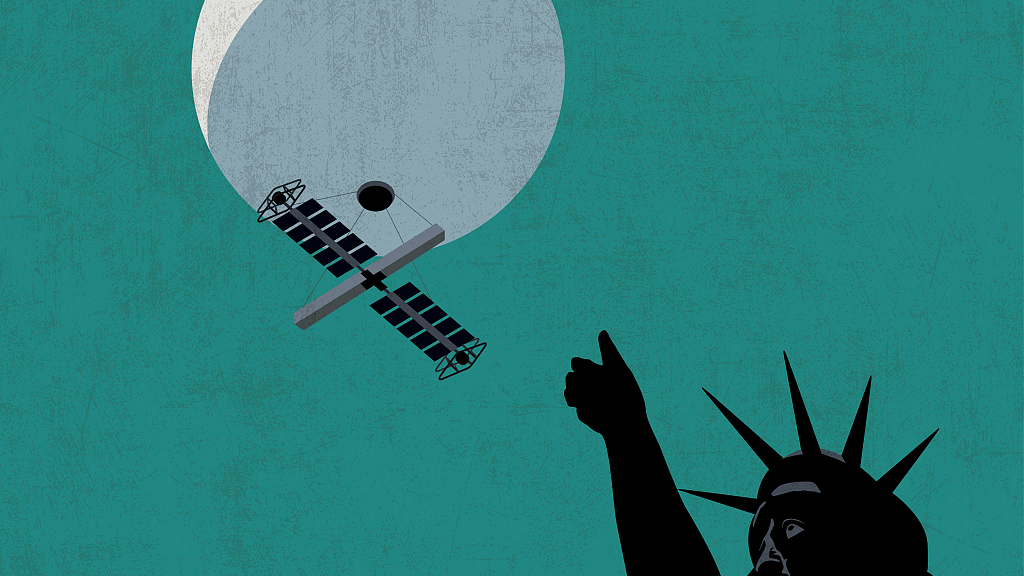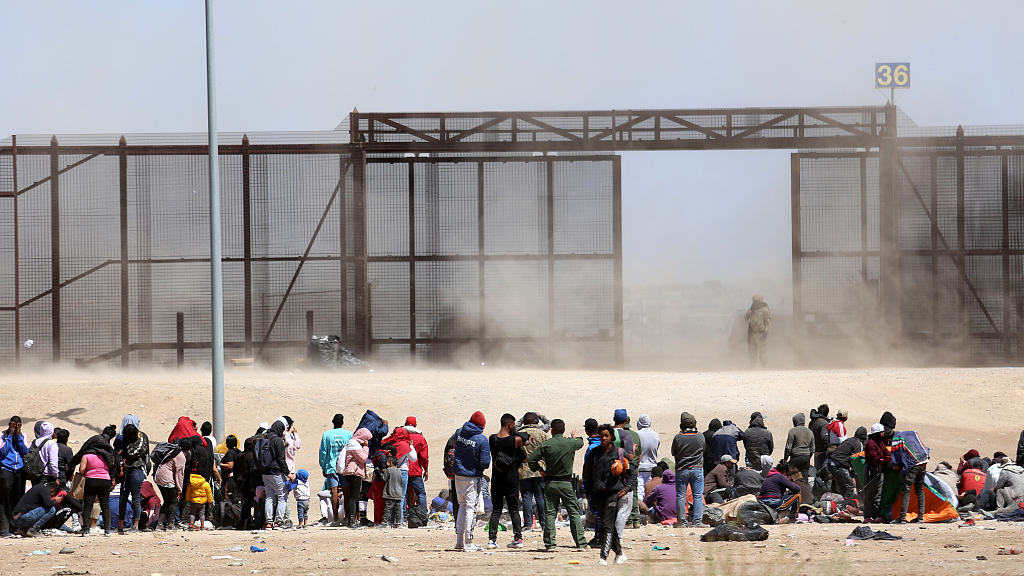
Editor's note: Qi Dapeng is a professor at the National Defense University of People's Liberation Army in Beijing and a foreign affairs commentator. The article reflects the author's opinions and not necessarily the views of the National Defense University or CGTN.
NBC reported on April 3 that the Chinese civilian unmanned airship shot down by the United States in February "was able to gather intelligence from several sensitive American military sites."
Since the U.S. shot down the Chinese airship by abusing force in violation of international conventions, its official spokespersons and media have kept speculating on the incident. Accusations abound such as "China uses spy balloons to spy on 40 countries across five continents," "China's military use of stratospheric balloons," and "Chinese spy balloons are equipped with electronic signal gathering devices," and the U.S. even instigated its allies to join in the hype. Former U.S. Deputy Secretary of State Robert Zoellick commented "the rest of the world wonders why," and at the Munich Security Conference, the U.S. delegates' speculation about the incident was seen as a laughing stock.
In fact, when the U.S. created history by using missiles to shoot down civilian balloons and churned up all the hype about it, it revealed a lot about how divided American politics is. Let's take a closer look and find out why the U.S. is so divided and how such division is related to the country's anti-China discourse.
Political division in the U.S. originated from the division between the rich and the poor in American society. For more than half a century, the U.S. has been the main engine and the biggest beneficiary of economic globalization, and it has gained enormous amounts of wealth from all over the world. However, the distribution of the wealth has been extremely uneven. Financial, high-tech, and defense-industrial interest groups have been the big winners, while the income of workers and other middle-class people has been declining, which has led to the ever widening of gap between the rich and the poor, and social tensions have been building up.
In the meantime, large numbers of immigrants have heightened such tensions and domestic racial conflicts. This is the root cause of the Occupy Wall Street movement, homegrown terrorism, frequent shootings, and anti-racist movements in the country.

Migrants from Mexico wait next to the U.S. border wall where U.S. Border Patrol agents stand guard in Ciudad Juarez, Mexico, March 30, 2023. /CFP
Migrants from Mexico wait next to the U.S. border wall where U.S. Border Patrol agents stand guard in Ciudad Juarez, Mexico, March 30, 2023. /CFP
The divide between the rich and the poor has led to a deep ideological split in the U.S. In 2016, when former U.S. President Donald Trump, representing white Christians and advocating populism, took office, the TIME magazine called him the "President of the Divided States of America." In 2020, when Joe Biden won the election, the magazine said that the U.S. would have "a time to heal."
However, instead of the traditional post-election reconciliation between the two parties, a mob of Trump's supporters attacked the U.S. Capitol, revealing to the world how nasty political confrontation within the U.S. could be. Subsequently, almost all the bills advocated by President Biden could not win any support from Republicans in Congress.
The political divide in the U.S. has solidified and deepened. The American political documentary The Great American Divide commented that during the Civil War, despite the domestic division and even a civil war, the country had the hope of solving the problem; during the Great Depression in the 1930s, also severely divided, the country had the same hope; however, for the current division, there is no hope of a solution.
So what's the internal relationship between this division and U.S.'s abuse of power and public opinion hype in the Chinese weather test balloon? In a politically divided U.S., being tough on China seems to be almost the only bipartisan consensus. Such division has inflated the fear and anxiety of the two parties about a rising China. Although it is difficult for the two parties to put aside their interests and stop internal disputes, both of them do not want China to surpass the United States.
This kind of anxiety caused by internal problems compounded by external ones has made increasing containment of China and maintaining U.S. hegemony almost the sole consensus between the two parties. This consensus is not only the basis for the Biden administration's continued hardline policy towards China, but also the root cause of the current wave of anti-China sentiment in Washington.
Against the backdrop of the polarization between the rich and the poor in American society, the lack of economic impetus, and the ongoing Russia-Ukraine crisis, the Biden administration sees the importance of improving relations with China.
However, its actions of catering to the domestic anti-China sentiment and its reaction to the balloon incident showed that it is handicapped by the harsh reality of domestic political division and is unable to make a rational policy towards China. As pointed out by Robert Zoellick, the Biden administration did so because "either the United States does not know what it wants from China – other than confrontation – or that domestic politics is frightening the administration away from shrewd and constructive action."
However, Zoellick's words are only about the domestic situation of the U.S.; for the world, a divided America is in no way a good thing. The "great speculator" George Soros once said that a declining superpower that has lost its political and economic dominance, but still has absolute military superiority, is very dangerous.
The world has seen so much of the irrationality of the U.S., a domestically divided hegemon, when it hyped up "China threat" and abused force to shoot down the Chinese civilian airship, kept supplying weapons to Ukraine, created the provocative story of "Ukraine today, Taiwan tomorrow," and scaled up arms sales to the Taiwan region.
In 2019, during my visit to the Pentagon with a delegation, a U.S. representative asked, "What misunderstandings does China think the U.S. has about China?" I was deeply impressed by the sanity and candidness of the question. I wonder how much of that rationality is still left in the U.S. today.
(If you want to contribute and have specific expertise, please contact us at opinions@cgtn.com. Follow @thouse_opinions on Twitter to discover the latest commentaries in the CGTN Opinion Section.)